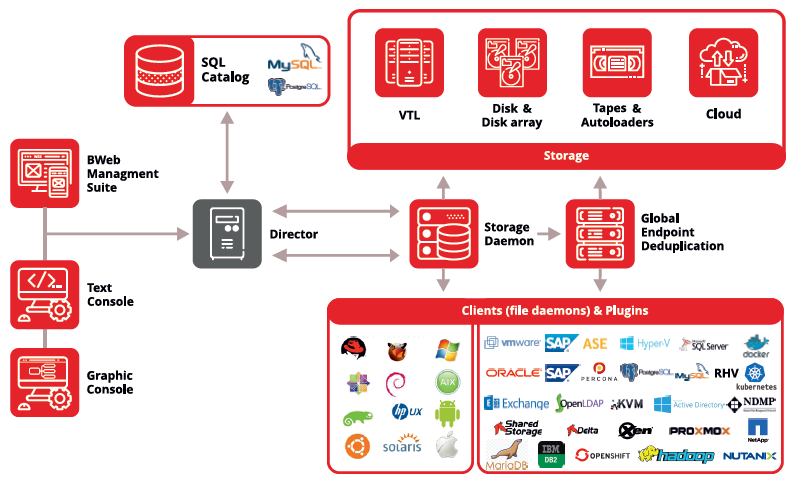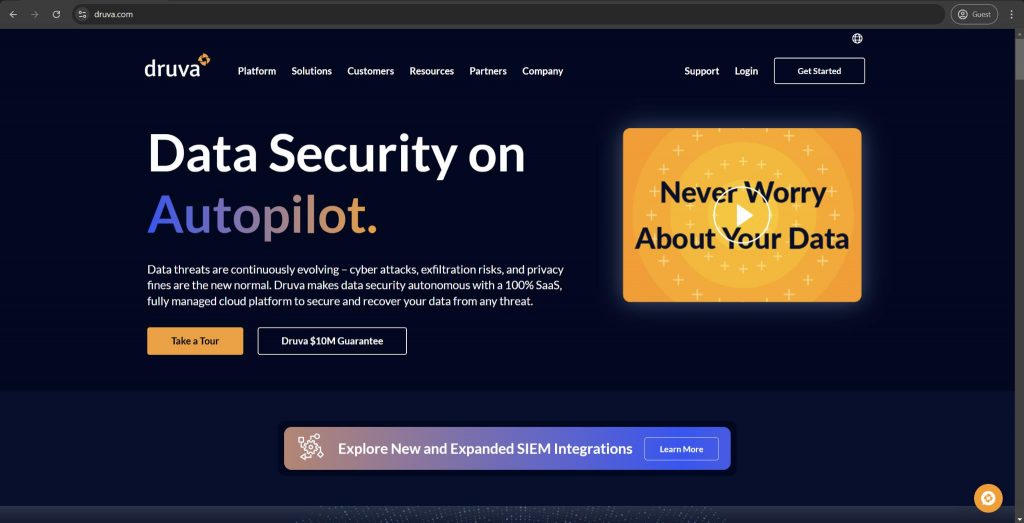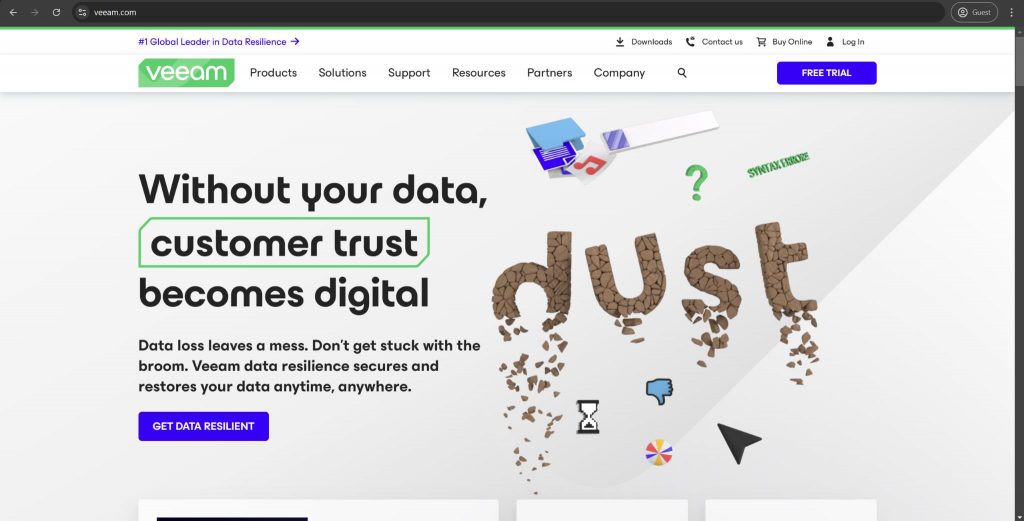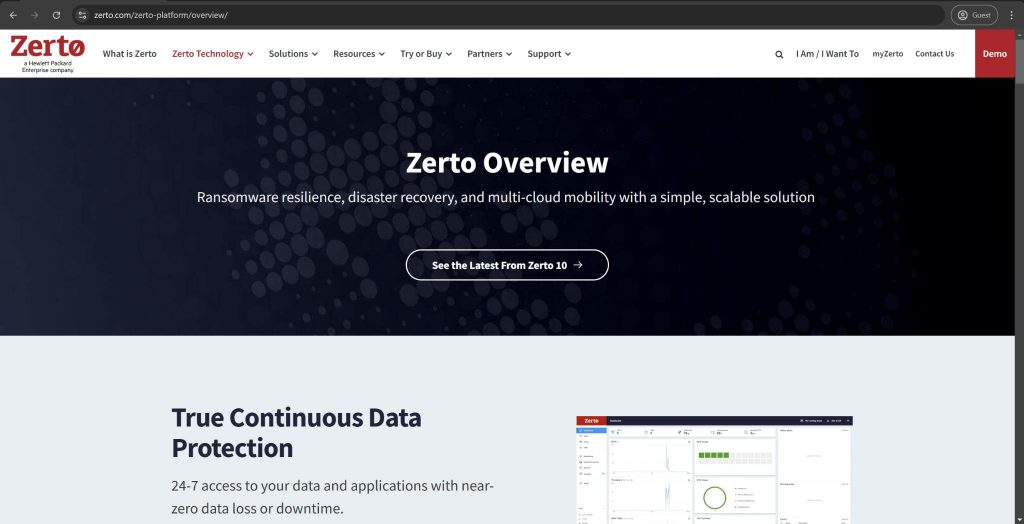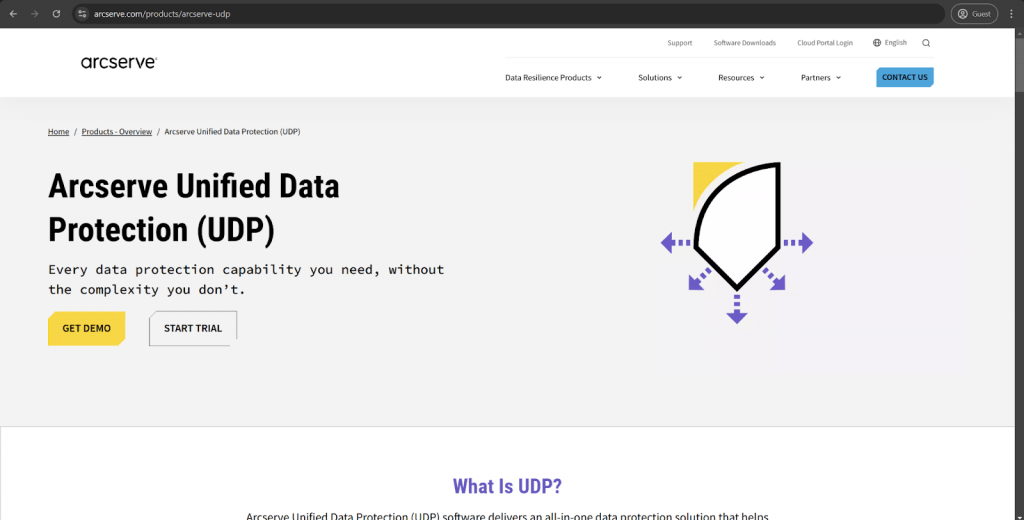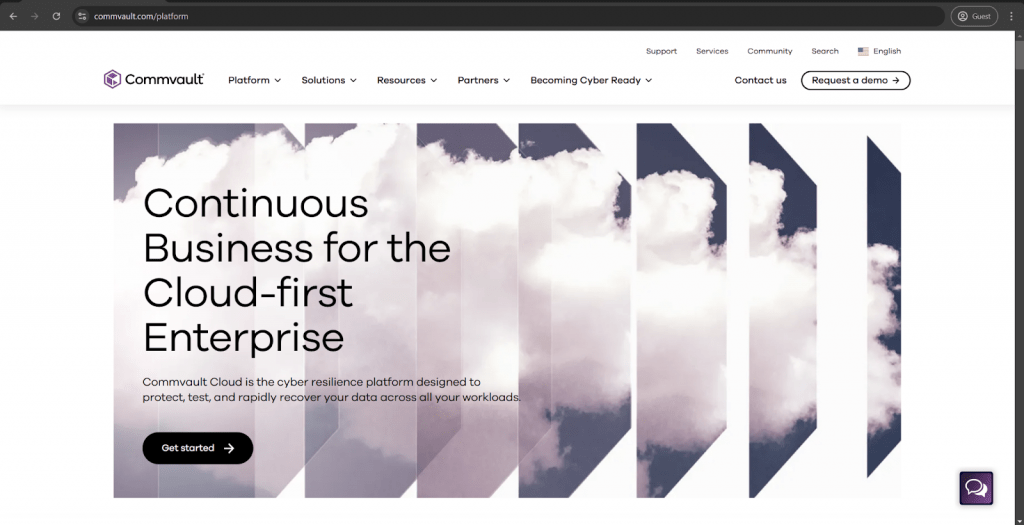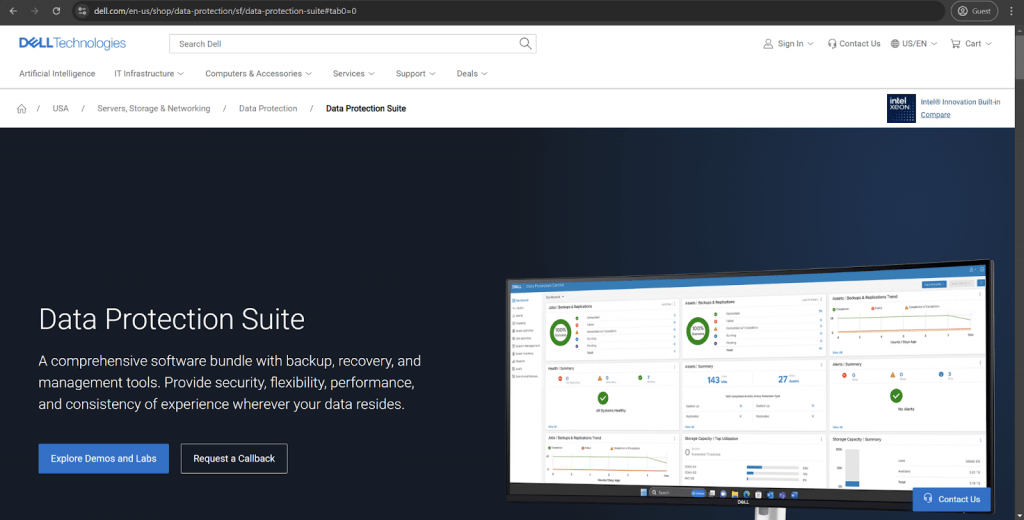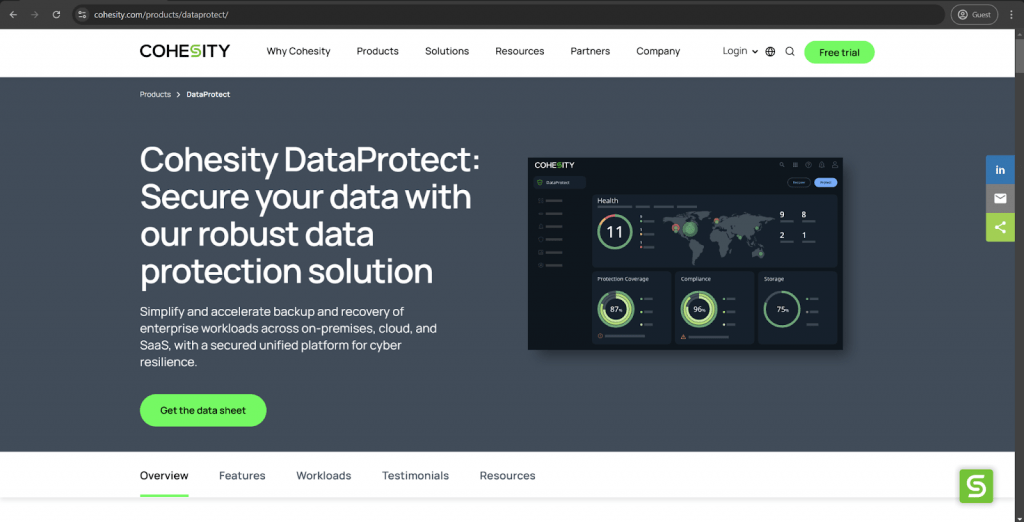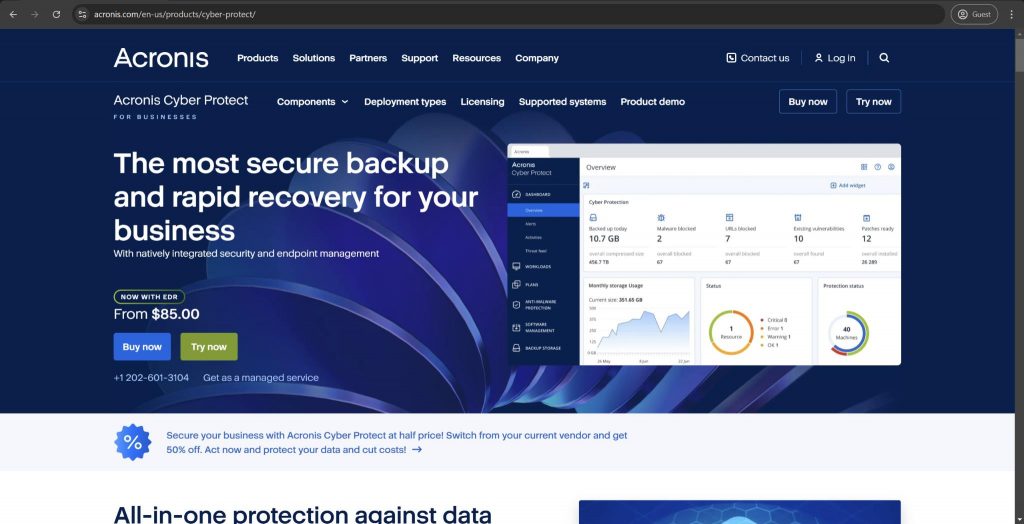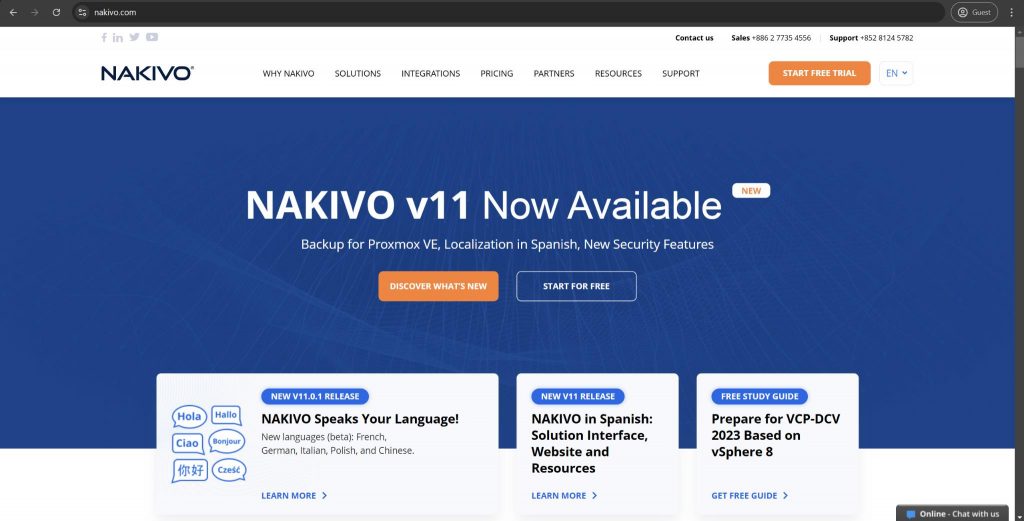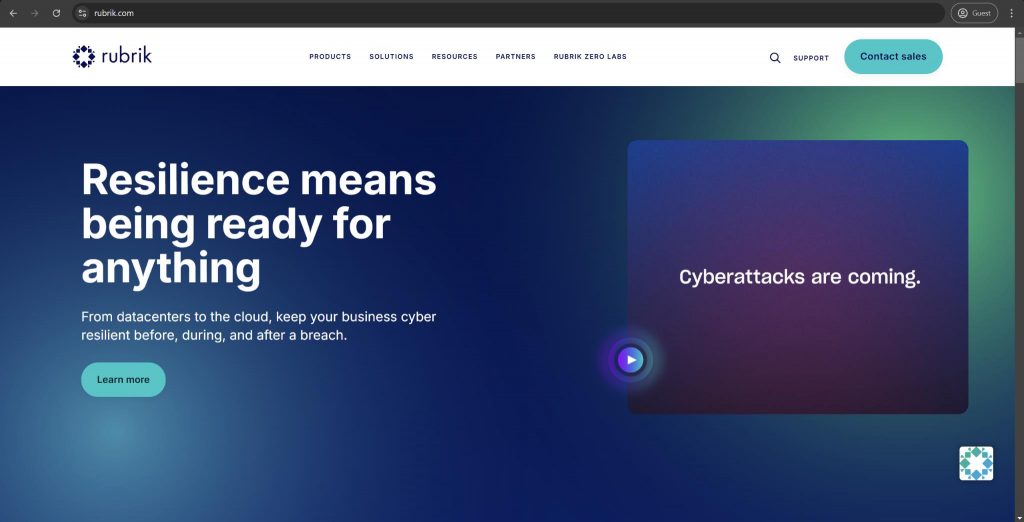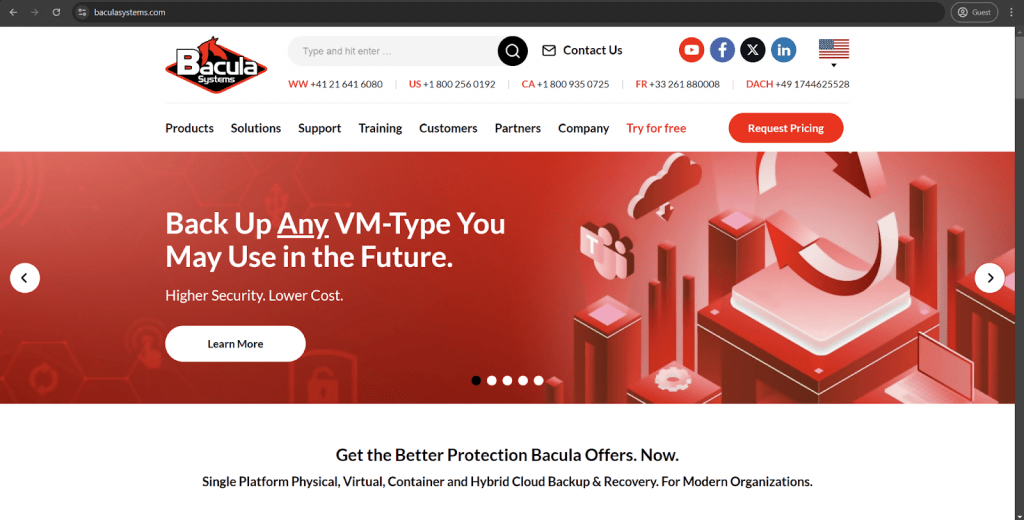Top Veritas competitors in the field
Below you’ll find several different examples of solutions that could be picked as Veritas alternatives:

Druva Data Resiliency Cloud puts its main focus on protecting cloud-based data, be it from applications or actual cloud storage locations, Druva is distributed as-a-service and can be used to perform a variety of data-related tasks, be it backup, archival, recovery, or even compliance. Druva also has a centralized management console and can improve data visibility while also securing it as much as possible. Druva uses innovative architecture to provide global data visibility with compliance controls but without using customer-managed hardware.
When compared to Veritas, Druva takes a somewhat different approach to data protection: more streamlined and less reliant on physical infrastructure. Veritas offers better on-premises deployment capabilities with broader storage target support, while Druva has significantly lower operational overhead with faster implementation. With all this in mind, we can recommend Druva to businesses that have already decided to use a zero-infrastructure backup solution. Veritas, on the other hand, is a much better fit for enterprises that need granular control over the entire backup infrastructure and all of the current storage environments within the infrastructure.
Customer ratings (at the time of writing):
- Capterra – 4.7/5 points based on 17 customer reviews
- TrustRadius – 9.7/10 points based on 489 customer reviews
- G2 – 4.7/5 points based on 615 customer reviews
- Gartner – 4.8/5 points based on 762 customer reviews
Advantages:
- User interface that is often described as convenient and user-friendly.
- Praise toward customer support with many years of positive reviews that can be easily found online.
- Impressive data security feature set with support for encryption, immutability, and many other features.
Shortcomings:
- Problematic first-time configuration process that often takes a long time to complete.
- Extremely long waiting time when restoring data from cloud storage.
- Limited customization capabilities in many features, including SQL cluster backups and Windows snapshots.
Pricing information (at the time of writing):
- Druva’s pricing is fairly sophisticated and offers different pricing plans depending on the type of device or application that is covered.
- The actual pricing values are no longer present on the public pricing web page, leaving only the detailed explanation of the pricing model itself with the following categories:
- Hybrid workloads:
- “Hybrid business” – calculated per Terabyte of data after deduplication, offering an easy business backup with plenty of features, such as global deduplication, VM file level recovery, NAS storage support, etc.
- “Hybrid enterprise” – calculated per Terabyte of data after deduplication, an extension of the previous offering with LTR (long term retention) features, storage insights/recommendations, cloud cache, etc.
- “Hybrid elite” – calculated per Terabyte of data after deduplication and adds cloud disaster recovery to the previous package, creating the ultimate solution for data management and disaster recovery
- Druva sells some features separately, such as accelerated ransomware recovery, cloud disaster recovery (available to Hybrid elite users), security posture & observability, and deployment for the U.S. government cloud.
- SaaS applications:
- “Business” – calculated per user, the most basic package of SaaS app coverage (Microsoft 365 and Google Workspace, the price is calculated per single app), offers 5 storage regions, 10 GB of storage per user, and basic data protection
- “Enterprise” – calculated per user for either/or Microsoft 365 or Google Workspace coverage, with features such as groups and public folders, as well as Salesforce.com coverage (includes metadata restoration, automated backups, compare tools, etc.)
- “Elite” – calculated per user for Microsoft 365/Google Workspace, Salesforce, includes GDPR compliance check, eDiscovery enablement, federated search, GCC High support, and many other features
- Some features here can also be purchased separately, such as Sandbox seeding (Salesforce), Sensitive data governance (Google Workspace & Microsoft 365), GovCloud support (Microsoft 365), etc.
- Endpoints:
- “Enterprise” – calculated per user, can offer SSO support, CloudCache, DLP support, data protection per data source, and 50 Gb of storage per user with delegated administration
- “Elite” – calculated per user, adds features such as federated search, additional data collection, defensible deletion, advanced deployment capabilities, and more
- There are also many features that can be purchased separately, including advanced deployment capabilities (available in the Elite subscription tier), ransomware recovery/response, sensitive data governance, and GovCloud support.
- AWS workloads:
- “Freemium” is a free offering from Druva for AWS workload coverage. It can cover up to 20 AWS resources at once (no more than 2 accounts), while offering features such as VPC cloning, cross-region and cross-account DR, file-level recovery, AWS Organizations integration, API access, etc.
- “Enterprise” – calculated per resource, starting from 20 resources, has an upper limit of 25 accounts and extends the previous version’s capabilities with features such as data lock, file-level search, the ability to import existing backups, the ability to prevent manual deletion, 24/7 support with a maximum of 4 hours of response time, etc.
- “Elite” – calculated per resource, has no limitations on managed resources or accounts, adds auto-protection by VPC, AWS account, as well as GovCloud support and SLA guarantees less than 1 hour of support response time.
- Users of Enterprise and Elite pricing plans can also purchase Druva’s capability to save air-gapped EC2 backups to Druva Cloud for an additional price.
- Druva also has a dedicated webpage (pricing calculator) for creating a personalized estimate of a company’s TCO with Druva in just a few minutes.
The author’s personal opinion of Druva:
Druva can be considered a somewhat different approach to backup as a process: it was born in the cloud and stayed there for most of its services. Druva avoids relying on traditional backup architecture, choosing to eliminate the need for any on-premises infrastructure. This is actually its biggest advantage and, sometimes, its biggest shortcoming. Not every company is ready to embrace a cloud-native approach to its backup frameworks, and Druva would likely struggle in working with a company with strict data residency requirements. Nevertheless, the platform itself is still a great way to protect remote workforces and sensitive business information, regardless of its shortcomings.

Veeam Backup & Replication is often regarded as one of the most popular solutions on the entire backup and recovery software market. It is a reliable backup solution with many different features, ranging from CDP and app-aware backups to DR replication, instant recovery to NAS, granular file recovery, Exchange/SharePoint/AD support, and more. Veeam can help businesses meet aggressive recovery objectives while also ensuring data availability in hybrid environments, proving its reputation as a modern data protection solution that was created with cloud and virtualized environments in mind.
Veeam is much more streamlined, with its virtualization support for Hyper-V and VMware environments, but its general data management capabilities are much more convenient, by comparison. It is also much faster than Veritas, even if it does limit itself to virtualized and cloud-based environments, while Veritas offers extensive legacy system support with integration capabilities for many types of storage. Veeam would be the go-to option for companies that are already heavily invested in cloud and virtualization technologies, while Veritas remains the better option for more complex environments that need traditional backup tools and broad platform support.
Customer ratings (at the time of writing):
- Capterra – 4.8/5 points based on 75 customer reviews
- TrustRadius – 8.9/10 points based on 1,605 customer reviews
- G2 – 4.6/5 points based on 636 customer reviews
- PeerSpot – 4.3/5 points based on 422 customer reviews
- Gartner – 4.6/5 points based on 1,787 customer reviews
Advantages:
- Simple and user-friendly configuration process for all new users.
- A substantial portion of the platform’s capabilities is available for free with limitations on the number of users and projects as a help for microbusinesses.
- Years of positive reputation accumulated for the customer support team.
Shortcomings:
- Learning the entire feature set of Veeam proves to be very challenging, a stark contrast to the convenience of its initial configuration process.
- General interface navigation has been an issue with Veeam for several years now.
- Veeam’s primary target audience is large businesses, and its pricing reflects that, which is why the solution is difficult to recommend for smaller businesses.
- Scalability is somewhat limited
- May struggle to handle large, complex IT environments
- Security levels may be questionable in certain use cases
Pricing information (at the time of writing):
- The only licensing information available on Veeam’s public website is its pricing calculator page, whichhelps users create a custom form to send to Veeam for a personalized quote.
An author’s personal opinion about Veeam:
It took time for Veeam to develop from a backup solution that specialized only in virtualization into the comprehensive multifaceted data protection platform it is today. To this day, it provides a relatively user-friendly experience with an abundance of features from which to choose. It is reliable and is compatible with a wide range of environments, making it one of the best options on the market for enterprises that want to invest into the most well-known backup software without a steep learning curve. With that being said, Veeam’s licensing model is puzzling, especially in the realm of cloud workloads, making it a more difficult sell in some situations.

Zerto is a cloud data protection platform that operates as a software-only offering capable of reducing or eliminating a lot of different issues across physical, virtual, and hybrid systems. Zerto can be used to simplify difficult topics such as data protection, data recovery, and even data mobility for companies of all shapes and sizes. It is a revolutionary approach to data protection and disaster recovery that relies on an innovative continuous data replication technology with near-zero Recovery Point Objectives, making it extremely granular and easily automated.
Zerto is much more complex when it comes to real-time replication, and its RTOs are significantly lower than what Veritas can provide, especially in cloud-native or virtualized environments. Its continuous data protection capabilities offer better disaster recovery orchestration and a higher degree of granularity, but Veritas is still muchbetter in supporting different platforms and storage types, especially in legacy infrastructures. Zerto’s primary client base is businesses that need aggressive recovery targets with an automated failover feature set, while Veritas is oriented toward companies that need broader workload support, even if that comes with longer RTOs or RPOs.
Customer ratings (at the time of writing):
- Capterra – 4.8/5 points based on 25 customer reviews
- TrustRadius – 8.3/10 points based on 122 customer reviews
- G2 – 4.6/5 points based on 73 customer reviews
- PeerSpot – 4.5/5 points based on 290 customer reviews
- Gartner – 4.6/5 points based on 225 customer reviews
Advantages:
- Easy and convenient integration with practically any existing business infrastructure.
- Substantial focus on information security does not limit the software’s backup-related capabilities.
- Relatively user-friendly interface that simplifies configuration for most backup and recovery processes.
Shortcomings:
- No support for any operating system other than Windows.
- Problematic reporting feature set with limited configuration.
- Total price tag that scales upwards extremely fast, making it less appealing for smaller businesses.
- Questionable security levels
- Limited scalability
Pricing information (at the time of writing):
- The official Zerto website offers two different licensing categories: Zerto for VMs and Zerto for SaaS.
- Zerto for VMs has:
- “Enterprise Cloud Edition” as a multi-cloud mobility, disaster recovery, and ransomware resilience solution
- “Migration License” as a dedicated license for data center refreshes, infrastructure modernization, and cloud migration
- Zerto for SaaS is a single solution that can cover M365, Salesforce, Google Workspace, Zendesk, and more.
- There is no official pricing information available for Zerto’s solution, it can only be acquired via a personalized quote or purchased through one of Zerto’s sales partners.
An author’s personal opinion about Zerto:
Zerto uses an unusual approach to backup software, offering disaster recovery as its main feature and backup capabilities as one of many tools to choose from. It offers clients near-continuous replication, capable of producing RPOs in minutes instead of hours, which makes it a great solution for any organization for which even a few minutes of downtime triggers massive negative consequences. Its commitment to such low downtime does make it more resource-intensive than many of its alternatives, but the rest of its capabilities, such as its ability to restore entire applications and many other useful capabilities, offset that downside for many of its customers. .

Arcserve UDP was presented with the intent of offering an enterprise-ready sophisticated solution without the complexity that usually comes with such solutions. It is a feature-rich backup and recovery platform backed by heterogeneous image-based technology that can cover a multitude of different data forms and storage types, from local workstations to M365, Microsoft SQL, PostgreSQL, VMware, Hyper-V, Microsoft AD, Oracle databases, and more. Its immutable storage capabilities with automated disaster recovery testing are very helpful in ensuring business continuity without extensive operational complexity, and its integrated cyber protection capabilities offer active ransomware protection and more traditional data protection capabilities.
Arcserve UDP is much more approachable and streamlined backup solution than is Veritas. It is much more straightforward in terms of disaster recovery, and its integrated security is significantly stronger. Veritas, on the other hand, provides many more backup and recovery features and granular control over most processes. With that in mind, we think Veritas is the better option for complex enterprises with strict compliance and data management requirements, while Arcserve works best for somewhat smaller companies that want to unify security and data management in the same cost-effective environment.
Customer ratings (at the time of writing):
- Capterra – 4.7/5 points from 9 customer reviews
- TrustRadius – 7.3/10 points from 13 customer reviews
- G2 – 4.3/5 points from 16 customer reviews
- PeerSpot – 3.8/5 points based on 43 customer reviews
- Gartner – 4.1/5 points based on 111 customer reviews
Advantages:
- Manyof its basic capabilities are accessible and convenient.
- Large selection of backup management and data security capabilities to choose from.
- Can begin operating without a physical deployment in a company’s on-site infrastructure.
Shortcomings:
- Generally limited mobility, due to the lack of a mobile version or a web-based interface.
- Substantial storage requirements, due to its lack of deduplication capabilities.
- Strong focus on large enterprises makes the software less than accessible for most SMBs, for several reasons.
Pricing information (at the time of writing):
- Arcserve UDP does not offer pricing information on its official website.
- The only way to obtain such information is to request a personalized quote from Arcserve.
The author’s personal opinion of Arcserve:
Arcserve UDP modernized its entire feature set without discarding several decades of experience in the field of backup operations. It can handle many modern-day challenges and tasks, while offering extensive coverage for traditional workloads, including both backup and data, management, data protection, and more. Arcserve sometimes feels as though part of its interface was not updated at the same time as the rest of the UI, but it is not a major drawback, and the sheer range of its built-in capabilities makes it an easy choice for many types of businesses.

Commvault Cloud is a fully-managed SaaS platform designed to fight infrastructure complexity at its core, by leveraging cloud-native capabilities for backup and recovery purposes while offering built-in ransomware protection and disaster recovery tools. It is a backup and recovery solution with three main target areas: data security, disaster recovery, and centralized management for complex systems or environments. It can create backups of operating systems, applications, and databases, supports virtual, physical, and hybrid environments, and is a generally impressive solution in terms of its feature set.
Commvault Cloud is much more streamlined toward cloud-based data protection than Veritas, especially in companies that are already seeking to eliminate on-premises infrastructure. Commvault’s cloud-first architecture gives it rapid implementation and low operational overhead, but its support for on-premises and virtual environments is also much less impressive than Veritas. With that in mind, companies seeking tmore control over their backup infrastructure and deployment methods should be much more inclined to choose Veritas, while Commvault Cloud remains one of the best options for businesses pursuing a cloud-first strategy.
Customer ratings (at the time of writing):
- Capterra – 4.6/5 points based on 47 customer reviews
- TrustRadius – 7.6/10 points based on 227 customer reviews
- G2 – 4.4/5 points based on 160 customer reviews
- PeerSpot – 4.3/5 points based on 108 customer reviews
- Gartner – 4.5/5 points based on 570 customer reviews
Advantages:
- Flexible and user-friendly backup configuration sequences.
- Extensive collaboration-oriented feature set that simplifies information exchange.
- Impressive feature set range as a whole and support for different types of infrastructures.
Shortcomings:
- Challenging first-time configuration sequence that can be simple or difficult, depending on many factors.
- The interface is not particularly user-friendly, especially for those with little prior experience in similar software.
- Somewhat rudimentary logging, monitoring and reporting capabilities.
Pricing information (at the time of writing):
- No official public pricing information can be found on Commvault’s website.
The author’s personal opinion of Commvault:
Modern-day Commvault is a unique solution that is extremely versatile and can handle many backup scenarios, making it an easy recommendation for most businesses. At the same time, such versatility comes at a price: it is incredibly complex, which does put a dampener on its potential to a certain degree. Commvault’s potential for data management goes far beyond regular backup and recovery tasks, making it possible to turn backups into searchable knowledge, even if it requires considerable effort and training to take advantage of the software’s full potential.

Dell Data Protection Suite is a backup and recovery solution that was built upon the shoulders of several other Dell products, such as Dell Avamar, Dell NetWorker, and Dell PowerProtect Data Manager. It is a comprehensive data protection solution that works with many different data storage types, ranging from physical to cloud, databases, VMs, and so on. Dell’s solution excels in streamlining data protection efforts across distributed environments using extensive integration options and automated workflow management capabilities.
Dell Data Protection Suite understandably integrates much more readily with Dell-branded hardware. It is not as flexible as Veritas in support for heterogeneous environments and third-party hardware, but it does prove itself when paired with Dell hardware, due to its deep integration capabilities. With that in mind, Veritas can be recommended for a much wider audience of businesses that require vendor-neutral data protection capabilities, while Dell Data Protection suite remains practically undisputed when paired with Dell-oriented business infrastructure such as storage units.
Customer ratings (at the time of writing):
- TrustRadius – 8.0/10 points based on 6 customer reviews
- G2 – 4.1/5 points based on 20 customer reviews
- Gartner – 4.6/5 points based on 797 customer reviews
Advantages:
- Support for several different operating systems and a large selection of storage types.
- Many features and tools are available in a single package.
- Easy access to basic backup and recovery processes, along with a relatively user-friendly interface.
Shortcomings:
- Extremely inconsistent customer support experience over many years.
- Potential issues with recovery procedures that might appear if the target hardware changed in any way since the backup process took place.
- Limited reporting capabilities with little-to-no customization options.
Pricing information (at the time of writing):
- There is no pricing or licensing information that could be found on Dell software’s official website.
An author’s personal opinion about Dell:
Dell Data Protection Suite is a collection of several previously known solutions from Dell in the same package. Such a combination made Dell’s offering both versatile and powerful in its own way, but the connection between what was known as different software is still not exactly seamless, making the experience somewhat distracting. At the same time, its modular approach has its own benefits in terms of flexibility for specific goals, especially in Dell-heavy environments that can integrate deeply with various Dell hardware pieces. At the end of the day, Data Protection Suite is a strong option for enterprise-grade backup and recovery tasks that would otherwise work best in a narrow range of situations at best.

Cohesity can deliver its hyperconverged secondary storage platform as the means to completely get rid of business data silos. It uses a web-scale architecture to consolidate a multitude of features in the same platform, be it backup, recovery, analytics, data management, and more. Cohesity’s backup solution is a sophisticated software-defined product that mostly targets cloud environments, it can offer extreme scalability to its customers, as well as an extremely thorough policy-based protection system. It works either as a service or deployed on-premise, and its RTO/RPO times are extremely impressive.
Cohesity takes a much more modern and consolidated approach to information management, especially when it comes to working with unstructured data and DevOps workflows. Veritas is a better performer in legacy environments, though, and its traditional backup features are much more extensive and versatile, by comparison. However, Cohesity’s feature unification excels in reducing infrastructure complexity, making it a much better option for companies that strive to modernize their data management infrastructures, while Veritas is much more suitable for complex enterprises with legacy requirements and the need for traditional backup approaches.
Customer ratings (at the time of writing):
- Capterra – 4.6/5 points based on 51 customer reviews
- TrustRadius – 8.5/10 points based on 86 customer reviews
- G2 – 4.4/5 points based on 47 customer reviews
- PeerSpot – 4.5/5 points based on 71 customer reviews
- Gartner – 4.8/5 points based on 810 customer reviews
Advantages:
- Simple backup and recovery management process for most standard cases.
- Plenty of unconventional features to choose from, like app-aware incremental backups.
- Convenient first-time configuration process that should not cause issues for anyone.
Shortcomings:
- A polarizing customer support experience, based on many customer reviews that cite standardized replies and the difficulty of finding a real person to talk to.
- Certain software upgrades cannot be deployed unless done manually using a command line interface.
- Somewhat problematic backup immutability feature that still leaves information vulnerable to any user with a high level of access.
- Offline, onpremises backup can be a challenge.
Pricing information (at the time of writing):
- There is no public pricing information on Cohesity’s official website.
The author’s personal opinion of Cohesity:
One of the most substantial advantages of Cohesity on the base level is its ability to combat data sprawl and information silos. Its backup services are just a fraction of the total range of its available data management capabilities. It can also turn backup information into productive assets for further development, analytics, or testing, even if its general approach to data consolidation tends to differ from most familiar backup concepts. It is a good example of a comprehensive data management platform that does not treat backups as merely an insurance policy, opening up new opportunities for business development.

Acronis offers one of the most comprehensive data protection solutions on the market, offering wide coverage of environment and storage types. It can offer blockchain-based authentication, enhanced backup validation, active ransomware protection, fast RTOs, and many other advantages. Acronis’s combination of AI-powered defense mechanisms provides proactive protection against many emerging threats that exist in the environment alongside traditional backup and recovery capabilities, making the solution very proactive in its data protection efforts.
When compared to Veritas, Acronis’s abundance of cybersecurity features and capabilities is much more security-centric than Veritas. On the other hand, Veritas offers much more in granular retention and enterprise backup capabilities, even if it does lag behind in terms of automated threat response and endpoint protection capabilities. Acronis would be preferred by businesses looking for a solution with a unified approach to backup and security, while Veritas is preferred in situations in which complex data lifecycle management tools are more important.
Customer ratings (at the time of writing):
- Capterra – 4.7/5 points based on 6 customer reviews
- TrustRadius – 5.9/10 points based on 139 customer reviews
- G2 – 4.3/5 points based on 700 customer reviews
- PeerSpot – 4.1/5 points based on 120 customer reviews
- Gartner – 4.4/5 points based on 324 customer reviews
Advantages:
- Support for many workload types, including standard physical and virtual environments, as well as hybrid options.
- Strong focus on information protection with support for AI-powered malware protection, data encryption, detailed monitoring, and more.
- Capability to gather large data volumes about the company’s infrastructure that can be further processed if necessary.
Shortcomings:
- Total price of the software is significantly higher than the market average.
- Strong data security features also necessitate powerful hardware that can work with these features without slowing the rest of the environment down.
- The interface is user-friendly but visually outdated, and its overall logic is sometimes very difficult to understand.
- Scalability limitations
- Limited compatibility with some technologies
- May not suffice for larger enterprises
Pricing information (at the time of writing):
- Acronis Cyber Protect can offer three different pricing versions
- Standard
- Advanced
- Backup Advanced
- Acronis Cyber Protect Standard includes the solution’s basic feature set. At the same time, Advanced adds extra features, such as support for XenServer, Oracle VM Server, Acronis Notary, Acronis ASign, tape backup, SAN storage snapshots, etc.
- The pricing for the Standard and Advanced versions is as follows:
- Workstation (physical or virtual, macOS or Windows):
- Standard: $85 per workstation;
- Advanced: $129 per workstation;
- Server (physical or virtual, Linux or Windows):
- Standard: $595 per server;
- Advanced: $925 per server;
- Virtual host (Hyper-V or VMware):
- Standard: $705 per host (unlimited VMs);
- Advanced: $1,175 per host (unlimited VMs);
- Additionally, a specific pricing tier is available in Acronis Cyber Protect Standard. It costs $285 for one instance of Microsoft Windows Server Essentials (physical/virtual), with app backup being its primary use case.
- The pricing structure for Acronis Cyber Protect – Backup Advanced varies depending on the nature of the backup target:
- From $109 per workstation (Windows/macOS, virtual/physical)
- From $779 per server (Linux/Windows, virtual/physical)
- From $1,019 per Hyper-V or VMware host (unlimited VMs)
- From $139 for Microsoft 365 data (SharePoint Online, Exchange Online, OneDrive for Business, Teams) or Google Workspace data (Calendar, Drive, Contacts, Gmail)
- Acronis Cyber Protect – Backup Advanced offers many features, including AD integration, image-based backups, ransomware protection, vulnerability assessment, reports, incremental/differential backups, file-level backups, group management, and more.
The author’s personal opinion of Acronis Cyber Protect:
Acronis Cyber Protect’s main goal is self-explanatory: pack as much information protection capabilities as possible in a backup solution. Substantial emphasis on data security measures is Acronis’s primary distinguishing trait, even though it is also a competent backup and recovery platform. It does tend to overlap with some of the existing security tools in certain businesses, making it an unlikely choice for large enterprises, but its overall integrated approach to backup and cybersecurity is generally not particularly common in the industry, making it an outlier of sorts. Acronis is at its most effective when working with endpoint security tasks: this is where the platform excels.

NAKIVO Backup & Replication is a multifunctional data protection solution that can work with most business sizes on the market. It can perform application-aware incremental backups, as well as instant recovery operations. It can work with regular Linux/Windows environments, as well as M365, Amazon EC2, Hyper-V, VMware, Nutanix AHV, and even Oracle databases. NAKIVO is a straightforward, but powerful, platform that excels in virtualized environments, while its wide array of features help maintain business continuity without substantial management overhead.
NAKIVO offers a much more focused, yet cost-effective, approach to data management than Veritas, especially in disaster recovery and virtualized data protection. Veritas’s platform coverage is much wider and has complex data management capabilities, but NAKIVO focuses instead on a slightly different part of the audience, one that prioritizes intuitive interface and streamlined licensing over feature complexity. As such, NAKIVO is a much better option for a smaller or newer business, while Veritas is the better choice for a large-scale enterprise with many complex requirements and nuances in its infrastructure.
Customer ratings (at the time of writing):
- Capterra – 4.8/5 points based on 427 customer reviews
- TrustRadius – 9.3/10 points based on 182 customer reviews
- G2 – 4.7/5 points based on 278 customer reviews
- PeerSpot – 4.7/5 points based on 87 customer reviews
- Gartner – 4.8/5 points based on 444 customer reviews
Advantages:
- Relatively simple first-time configuration process with little-or-no potential issues.
- Fast and responsive customer support experience reported by many past and current clients.
- Generally user-friendly interface that simplifies navigation between feature sets.
Shortcomings:
- The majority of customer support knowledge is based on the Windows version of the software, making it more difficult for Linux users to obtain help.
- Basic and restrictive logging and reporting capabilities.
- Substantially high price tag, putting NAKIVO beyond a lot of its competitors in terms of the cost.
- Questionable security levels in mission-critical environments.
Pricing information (at the time of writing):
- NAKIVO’s pricing consists of two main licensing groups:
- Subscription-based licenses:
- “Pro Essentials” – from $1.95 per month per workload, covers most common backup types such as physical, virtual, cloud and NAS, while also offering instant granular recovery, virtual and cloud replication, storage immutability, and more
- “Enterprise Essentials” – from $2.60 per month per workload, adds native backup to tape, deduplication appliance integration, backup to cloud, as well as 2FA, AD integration, calendar, data protection based on policies, etc.
- “Enterprise Plus” does not have public pricing available, it adds HTTP API integration, RBAC, Oracle backup, backup from snapshots, and other features
- There is also a subscription available for Microsoft 365 coverage that costs $0.80 per month per user with an annual billing and can create backups of MS Teams, SharePoint Online, Exchange Online, OneDrive for Business, and more
- Another subscription from NAKIVO is its VMware monitoring capability that comes in three different forms:
- “Pro Essentials” for $0.90 per month per workload with CPU, RAM, disk usage monitoring and a built-in live chat
- “Enterprise Essentials” for $1.15 per month per workload that adds AD integration, 2FA capability, multi-tenant deployment, and more
- “Enterprise Plus” with no public pricing that adds RBAC and HTTP API integrations
- We should also mention the existence of a Real-time Replication pricing tier that offers the feature with the same name for VMware vSphere environments for $2.35 per month per workload with 2FA support and Microsoft AD integration.
- All prices mentioned above are presented with a three-year plan in mind and smaller contract lengths might have different pricing points.
- Perpetual licenses:
- Virtual environments:
- “Pro Essentials” for $229 per socket, covers Hyper-V, VMware, Nutanix AHV, and features such as instant granular recovery, immutable storage, cross-platform recovery, etc.
- “Enterprise Essentials” for $329 per socket, adds native backup to tape, backup to cloud, deduplication, 2FA, AD integration, and more
- “Enterprise Plus” with no public pricing that adds RBAC and HTTP API integrations, as well as backup from storage snapshots
- Servers:
- “Pro Essentials” for $58 per server, covers Windows and Linux, and features such as immutable storage, instant P2V, instant granular recovery, etc.
- “Enterprise Essentials” for $76 per server, adds native backup to tape, backup to cloud, deduplication, 2FA, AD integration, and more
- “Enterprise Plus” with no public pricing that adds RBAC and HTTP API integrations
- Workstations:
- “Pro Essentials” for $19 per workstation, covers Windows and Linux, and features such as immutable storage, instant P2V, instant granular recovery, etc.
- “Enterprise Essentials” for $25 per workstation, adds native backup to tape, backup to cloud, deduplication, 2FA, AD integration, and more
- “Enterprise Plus” with no public pricing that adds RBAC and HTTP API integrations
- NAS:
- “Pro Essentials” for $149 per one Terabyte of data, can backup NFS shares, SMB shares, folders on shares, and offer file level recovery
- “Enterprise Essentials” for $199 per one Terabyte of data, adds AD integration, 2FA support, calendar, multi-tenant deployment, etc.
- “Enterprise Plus” with no public pricing that adds RBAC and HTTP API integrations
- Oracle DB:
- “Enterprise Plus” is the only option available for Oracle database backups via RMAN, it can offer advanced scheduling, centralized management, and more for $165 per database.
- VMware monitoring:
- “Pro Essentials” for $100 per socket with CPU, RAM, disk usage monitoring and a built-in live chat
- “Enterprise Essentials” for $150 per socket that adds AD integration, 2FA capability, multi-tenant deployment, and more
- “Enterprise Plus” with no public pricing that adds RBAC and HTTP API integrations
- Real-time Replication:
- Enterprise Essentials for $550 per socket with a basic feature set.
- Enterprise Plus with no public price tag that offers RBAC support, HTTP API integration, etc.
The author’s personal opinion of NAKIVO:
NAKIVO’s user friendliness is its primary distinguishing trait, considering how difficult most backup solutions tend to be from the standpoint of UI and navigation. With that being said, NAKIVO’s straightforward approach is not its only advantage: it is also refreshingly flexible and does not have enough features to make navigation confusing. This last trait might be considered by some a disadvantage, but there are many businesses that prefer a more limited feature set if it is provided in a user-friendly and intuitive manner. NAKIVO excels in handling most common backup tasks with speed and efficiency, especially in virtualized environments.

Rubrik is a backup and recovery solution that acts as a centralized data management solution for many environment types, including virtual, physical, and hybrid. It can act as a great protective layer for many data types against ransomware, internal threats, and operational failures, while also offering features such as scalability and cloud integration to all of its customers. Rubrik’s strongest feature is its simplified approach to data protection, using a scale-out platform that can unify data management, backup, and recovery processes under the same administrative umbrella. It also offers the very rare ability to execute global search and analytics across the entire environment, made possible by its metadata engine.
Rubrik’s approach to data protection is much more streamlined and modern than Veritas’s, specially in cloud-native and virtual environments. Rubrik can also dramatically reduce operational complexity with a simplified management environment and SLA policy automation, which is in stark contrast to Veritas’s broad support for legacy environments. In this context, Rubrik would be the better choice for companies that are considering IT modernization, while Veritas is still better for older businesses that must have legacy infrastructure elements in their modern environment.
- Capterra – 4.8/5 points based on 74 customer reviews
- TrustRadius – 7.8/10 points based on 234 customer reviews
- G2 – 4.6/5 points based on 94 customer reviews
- PeerSpot – 4.6/5 points based on 89 customer reviews
- Gartner – 4.7/5 points based on 763 customer reviews
Advantages:
- The administrative user interface is convenient and flexible.
- Extensive cloud integration capabilities that support hybrid storage frameworks and multi-cloud infrastructures.
- Impressive range of automation capabilities with several customization options.
Shortcomings:
- First-time configuration is often a long and challenging process.
- Limited selection of official documentation and no other sources of information about the software and its capabilities.
- Surprising rigidity in features in some cases, such as its inability to directly transfer Azure SQL backups to a cloud storage.
- Limited architectural choice
Pricing information (at the time of writing):
- Rubrik’s official website offers little in terms of its licensing model or pricing information. What it does offer is a suggestion to request a personalized quote that would also include custom-tailored pricing points for each client.
The author’s personal opinion of Rubrik:
It would be fair to say that Rubrik has been successful in rethinking the entire concept of a backup solution to make it more cloud-first and less reliant on legacy processes. One of most innovative ideas behind Rubrik is its combination of user-friendliness and automation, removing the need for a skilled professional to handle backup tasks. It operates very differently than do most traditional backup solutions, which might make it less appealing to some businesses, but the combination of simple data searches and policy-driven automation is enough for many businesses to overlook this disadvantage. It would also be fair to say that Rubrik finds most of its fans in more modern organizations that are less likely to embrace more automated processes than to use traditional manual backup methods..

Most Western Military organizations rely on Bacula, as do some of the most security-conscious companies in the world. Bacula’s wide feature set adapts itself readily to complicated or varied IT environments that have many different databases, hypervisors and cloud interfaces, enabling the user to consolidate IT estates, backup and recovery under a single pane of glass. Much of its code is open-source-based, which gives it far higher levels of transparency than most other vendors. This combination of features, value, customizability and high security means Bacula is a popular choice for government organizations, especially military, research laboratories, and other mission-critical government organizations. IT is also widely used in HPC and suoer computing environments, or in other deployments that have heavy workloads and/or high data volume,
Bacula can offer somewhat more cost-effective licensing when compared with Veritas, because it does not use capacity-based pricing. Its overall cost-effectiveness is also improved by its potential for substantial customization and its flexible deployment options. Still, the user-friendliness of its interface puts Veritas on par, and its cloud integration capability is much more streamlined out of the box. As such, Bacula is the better choice for more technically proficient teams, while Veritas may be better for organizations looking for a turnkey solution.
Customer ratings (at the time of writing):
- TrustRadius – 9.7/10 points based on 63 customer reviews
- G2 – 4.7/5 points based on 56 customer reviews
- PeerSpot – 4.4/5 points based on 10 customer reviews
- Gartner – 4.7/5 points based on 5 customer reviews
Advantages:
- Able to create a comphensive backup and recovery framework using only Bacula’s capabilities.
- Impressive variety of supported environments, including physical servers, databases, applications, tape, VMs, clusters, legacy technologies, etc.
- Its ability in especially high security levels is confirmed by the fact that Bacula is used in security-conscious government, research and defense agencies over the years.
- Bacula is extremely scalable, both from a licensing model aspect, and from a technical scale-up or scale-out perspective
- High levels of flexibility and customizability, allowing a solution architect to deply Bacula in a way that suits his or her organization.
- Bacula is storage-agnostic, allowing users to benefit from using exactly the best kind of storage for their use-case
- Bacula’s software development and roadmap is progressing rapidly, lowering risk of investment.
- Bacula’s architecture is modular – users only pay for what they need.
Shortcomings:
- The choice between two interfaces for interacting with Bacula does not deter from the fact that the GUI could perhaps be more user-friendly.
- Initial setup and configuration processes can be challenging for some users, especially the ones that do not have prior experience with Linux and similar environments.
- Certain features and tools have their own price tag on top of the overall subscription fee.
Pricing information (at the time of writing):
- Bacula Enterprise’s pricing information is not publicly available on its official website. The only way to obtain such information is by contacting the company directly for a quote.
- However, a lot of general licensing information is available on that same website. For example, there are plenty of different subscription plans that Bacula Enterprise can offer, even though there is no pricing available for any of them:
- BSBE – Bacula Small Business Edition – can cover no more than 20 agents and two contracts, offering features such as web support and BWeb management suite
- Standard – can cover up to 50 agents and two contracts, adds support answer deadlines (from 1 to 4 business days)
- Bronze – can cover up to 200 agents and two contracts, offers phone support and shorter deadlines for customer support (from 6 hours to 4 days)
- Silver – can cover up to 500 agents and three contracts, introduces a deduplication plugin and a lower customer support answer deadline (from 4 hours to 2 days)
- Gold – can cover up to 2,000 agents and five contracts, drastically reduces customer support answer deadline (from 1 hour to 2 days)
- Platinum – can cover up to 5,000 agents and five contracts, has PostgreSQL catalog support and one training seat per year for Administrator courses
The author’s personal opinion of Bacula Enterprise:
Bacula Enterprise’s platform offers a truly impressive number of features and capabilities in one package. It uses a modular approach to its features and does not charge based on the volume of data covered, making it a great option for large businesses and enterprises. Bacula prioritizes raw functionality and efficiency over modern interfaces, though, meaning its web interface, called BWeb, may appear daunting to newcomers. It is a great choice for businesses that require deep control over their backup infrastructure and have the skills to control such an environment efficiently.

